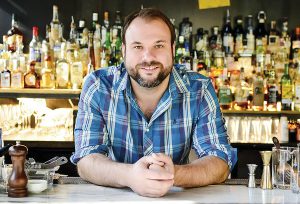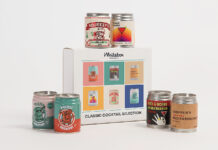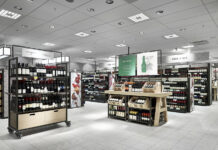
Growing up in Wyoming with a stint in Oregon, Dallas-based Michael Martensen (@imbibemartensen on Twitter) moved to Argentina not long after high school. At 19, he wasn’t feeling inspired by much and was unsure of what direction to head, in schooling or work. But his dad, who worked in the oil business, urged him to come down to Argentina for a while to study Spanish and for a change of pace. Here, his love of wine and food took root as he got hooked on Argentinean food, visited local wineries and drank fernet (the Italian herbal liqueur ubiquitous around Argentina).
By age 21, he was back in the States working on the island of Nantucket at Topper’s at the Wauwinet (www.wauwinet.com/dining), a Relais & Châteaux property where cellar master Craig Hanna took Martensen under his wing, tasting him on a wide range of wines from their award-winning cellar. With access to over 90 whiskeys, bar manager Mitchell Graff similarly educated Martensen on spirits. As these mentors tasted him on such rarities as Knappogue 1951 whiskey to 1952 Mouton Rothschild, a light went on. Martensen realized he could make a living doing this, pursuing exceptional hospitality and drink simultaneously. And to be at one of Martensen’s bars is to experience warm, relaxed and accepting hospitality.
He eventually moved to Dallas where he helped open James Beard Award-nominated The Cedars Social (www.thecedarssocial.com) and the now-closed Smyth before going on to open Proof + Pantry (www.proofandpantry.com) in 2014 under Misery Loves Company, the hospitality management firm he cofounded with Sal Jafar II. Conveniently next to the Winspear Opera House, Proof + Pantry quickly became a Dallas favorite, offering comforting New American fare and Martensen’s well-balanced cocktails.
They followed up with their French-Mexican restaurant Madrina (http://madrina.herokuapp.com), opened September 2015, serving tamales alongside rabbit rillettes. At Madrina, Martensen breaks down his menu by French- and Mexican-inspired cocktails, with his spirits grouped broadly under agave or brandies.
At both restaurants, he seeks to mentor and train bar staff like he was trained back on Nantucket, imparting passion and precision, working on cocktails until they are consistent from each bartender, educating on spirits, wine and especially, hospitality. In his own words, Martensen shares with us how living in Dallas affects his bar style, what is exciting him now in craft spirits, and how he gets guests interested in new spirits they haven’t tried before.
What led to your path as a bartender/bar manager?
I was living down in Argentina after high school. I started eating and drinking things at that time that I have never eaten before. The asado [Argentinian barbecue] with Malbec; Fernet con Coca [Fernet with Coca-Cola] in the nightclubs. It was a life-changing experience, and I knew that in some form or fashion I would be in the food and beverage biz. I then moved to Nantucket for a summer and worked at Topper’s at the Wauwinet where the management team educated me on hospitality and products. I was hooked.
What do you consider your bar style and how does living in Dallas determine or affect that?
I am somewhat of a purist. There is a methodology in making a good drink, not just technically, but also with a smile—after all, this is the hospitality business. We all need to be thankful that we have guests and friends that decide to spend time in our establishments. Living in Dallas is about just that: Hospitality. As for style of drink in Dallas, it is wide open. We are “the third coast” and right now that means we can create our own path. Living in Texas, though, does not really give you all four seasons so the cocktail menus are not all based on just seasons. We do, however, have the best citrus in the United States, so come fall, winter and spring, juice is king.
What is your philosophy on deciding what brands to stock at your bar, and what mix do you prefer of large and small brands?
Proof + Pantry is a small bar/space with limited storage. This is a fun challenge, though. The back bar changes with the season. In winter we purchase more brown spirits; in summer, more neutral and unaged spirits. Our guests love it because we are constantly bringing in new items and cocktails for them to drink.
At Madrina, the bar is a fusion of French and Mexican cuisine. The two cultures are as romantic as the spirits they make. The craft goods from both are just stunning—small-batch brandies from France, to one of the most rustic spirits in the world from Mexico: Mezcal. It’s [at Madrina] an amazing marriage of two cultures. Our back bar has around 110 selections of agave spirits and 90 selections of brandies.
How do you educate customers on brands they might not have heard of?
One tactical educational event we hold every two weeks is partnering with a craft spirit, offering a neat or rocks pour paired with chef-composed bar canapés. This allows the guest to get a great experience at the bar while trying something new. The guests take the time to learn about the alcohol they are tasting along with the food that it is paired with. For only $15, we serve three bites and something neat or on the rocks because we don’t want to adulterate it—we want people to taste the spirit. There is great value to that and guests love it.
What advice would you give to distilleries looking to be represented in quality cocktail bars? And how do you ensure the best spirits and cocktail offerings for your customers?
Honestly, consistency. Not necessarily a flavor profile but just making a good, quality spirit. The key is consistency. It’s a balancing act. As a bar manager, you are bringing in all the cool shit because it’s new and cool, but it’s not all good? What’s the point? But if you can understand what a good distillate is and build a bar with good distillates, then you’re going to have a winning bar where everyone is going to have a great cocktail in front of them. When you make great cocktails, you have great business.
When it comes to cocktails, if I have winners, I don’t take them off the menu. If you have a loser, get rid of it. Our goal is to have a menu of all winners. If you’re training your bar staff, the drinks have to be perfect every time and should be second nature.
What are some micro-distillers/small-batch brands that are exciting you right now?
I love everything coming out of Colorado. The Leopold guys [www.leopoldbros.com in Denver] just rock. They are doing it right by making different, unique spirits—from absinthe to fernet to whiskey—yet are still very consistent. Just awesome.
I was just in Oaxaca last week: Always a spiritual trip, from the food to the drink. The people are so humble, which is mind-blowing because they are making some of the best spirits in the world.








